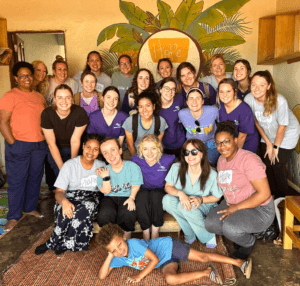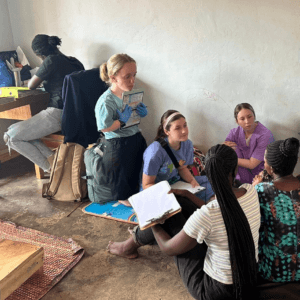Good nutrition is essential to keep current and future generations healthy across their lifespan. Whether you’re feeding hungry families halfway around the world, or the needy right outside your door, the importance of nutrition has grown exponentially throughout the last few years. According to the World Health Organization, nutrition is a critical part of health and development. The better nutrition a person receives as a child, the stronger their immune systems and longevity will become. In fact, children with adequate nutrition develop rapid signs of growth leading to more productivity, creativity and intelligence, thus widening opportunities to break the cycles of poverty and hunger gradually. However, the climb to this ideal state is rather difficult.
families halfway around the world, or the needy right outside your door, the importance of nutrition has grown exponentially throughout the last few years. According to the World Health Organization, nutrition is a critical part of health and development. The better nutrition a person receives as a child, the stronger their immune systems and longevity will become. In fact, children with adequate nutrition develop rapid signs of growth leading to more productivity, creativity and intelligence, thus widening opportunities to break the cycles of poverty and hunger gradually. However, the climb to this ideal state is rather difficult.
Malnutrition, in every form, is present worldwide and has created significant threats to humans and their health. Existing in predominantly low- and middle-income countries, nutritionists and dietitians have been actively working to lower the double burden of malnutrition including undernutrition (wasting or stunting), inadequate vitamins or minerals, overweight, obesity, and resulting diet-related noncommunicable diseases. The developmental, economic, social, and medical impacts of the global burden of malnutrition are serious and lasting for individuals and their families, communities and countries – and that’s why ACU Online’s M.S. in Nutrition/Dietetic Internship program is actively working to bring the problem home by exposing their students to the worldwide food crisis at hand.
Meeting The Ugandan Nutrition Crisis
Historically speaking, Uganda held a strong economic performance that averaged 7 percent between the 1990s and early 2000s, making it one of the fastest-developing African countries. However, as the influx of population grew, and employment opportunities plummeted, Uganda turned its focus on agricultural productivity, leading to accelerated and sustained growth. With 84 percent of the population still living in rural areas, agriculture has remained the main source of income for the majority of Ugandans, resulting in Uganda ranking in the bottom quartile of developed countries. According to the Uganda Poverty Assessment, the proportion of the population living in extreme poverty remains high; for every three Ugandans who get out of poverty, two fall back in. Understanding the odds of getting out of poverty, the life expectancy is rather low due to the lack of nutrition and dietetic training needed to sustain oneself with the means they have.
The U.S. Agency for International Development found that almost one-third of children under five years in Uganda are stunted, in more ways than one. As more children are born to mothers with little to no education, the percentage of children having their food needs met declines dramatically. On top of this, Ugandan women give birth to an average of five children, straining family resources including food. This adds to the serious consequences of malnutrition, illness, and even death for those born into those families. With other drivers of malnutrition rising, including lack of access to clean water and sanitation, harsh working environments, gender inequalities in the fields and high disease burdens like childhood diarrhea and malaria, nutritionists have found a steady rise in poor infant and young child feeding practices.
Because of all of these circumstances, advocates and nutritional experts have joined forces to not only meet some of the needs of the crises occurring in Uganda but also expose students to real-world issues beyond their doorstep. These forces include ACU Online.
Student Trip Sponsored By Wildcats on Academic Mission
Organized by The Halbert Center for Missions and Global Service, ACU Online’s M.S. in Nutrition/Dietetic Internship allows students to integrate academics and missional work by traveling and serving in a three-week mission trip to Uganda as part of the ACU’s Wildcats on Academic Mission (WAM) program – at no cost. Combining students’ academic study with missional living around the globe, WAM fully integrates mission and service into academic degree plans by working with departments and teams on fully funded projects that meet the needs of the world today.
Dr. Sheila Jones, program director for M.S. in Nutrition, says this is a once-in-a-lifetime opportunity that few students, or universities, ever get. Having taken the trip herself, multiple times, Dr. Jones says she has seen firsthand the blessings and hardships of this specific trip. Witnessing the injustices, lack of food provisions and desperate need of Ugandan mothers needing resources for their children, Dr. Jones believes this opportunity is not for the faint of heart.
“Students should know this is not a vacation,” Dr. Jones said. “This is a service opportunity and if anything, a chance to just be an additional resource for people who live through the heartaches of malnutrition and food insecurity, every single day. This trip was designed to reveal the real needs of the world to our students and put our students in the middle of it so they can act.”
Through ACU Online’s M.S. in Nutrition/Dietetic Internship program, students can have the unique opportunity to travel to Uganda with their colleagues, faculty members and nonprofits like Hope Speaks to learn how to work with Ugandans suffering from nutritional issues. Working alongside Ugandan caregivers and missionaries, students will become hyper-involved in educating mothers and children about the importance of nutrition while simultaneously conducting nutrition assessments for research purposes, and serving on the ground.
“This trip is hard work but so rewarding,” Dr. Jones said. “ACU has worked diligently to contact the right people and organizations to ensure our students are getting an experience that adds to their education as well as their world perspective. That’s our goal – to get students deeply interested and active in their communities after seeing how other parts of the world live.”
 Fully funded by donors who believe “missions” do not need to be separate from an individual’s talents, training, and career, students involved in the M.S. in Nutrition/Dietetic Internship program will continue their focus on the pillar issues of “hunger,” “health,” “housing,” and “hope.” As the program continues to grow, students interested in professionally working in nutrition and dietetics can begin their efforts by enrolling in the program. Comprised of 39 credit hours, students in the M.S. in Nutrition/Dietetic Internship program will be submerged into the world of nutrition by acquiring the knowledge necessary to improve the quality of health and well-being among those who have limited resources. Aimed at meeting the growing need for dietetics in schools, organizations and nonprofits, the program prepares graduates for leadership in the field of nutrition and dietetics by getting them to pass the Commission on Dietetic Registration (CDR), the credentialing exam for dietitian nutritionists.
Fully funded by donors who believe “missions” do not need to be separate from an individual’s talents, training, and career, students involved in the M.S. in Nutrition/Dietetic Internship program will continue their focus on the pillar issues of “hunger,” “health,” “housing,” and “hope.” As the program continues to grow, students interested in professionally working in nutrition and dietetics can begin their efforts by enrolling in the program. Comprised of 39 credit hours, students in the M.S. in Nutrition/Dietetic Internship program will be submerged into the world of nutrition by acquiring the knowledge necessary to improve the quality of health and well-being among those who have limited resources. Aimed at meeting the growing need for dietetics in schools, organizations and nonprofits, the program prepares graduates for leadership in the field of nutrition and dietetics by getting them to pass the Commission on Dietetic Registration (CDR), the credentialing exam for dietitian nutritionists.
“This program is pretty rigorous and requires a student who is dedicated to becoming a future nutritionist and dietitian,” Dr. Jones said. “The goal, as always, is to prepare students for the workforce which is why we’re very excited to bring on more students who want to serve the world and their communities. We believe that trips like our Uganda service opportunity is a great way to get our students ready for the work ahead.”
If you are interested in learning more about the M.S. in Nutrition/Dietetic Internship program, visit our website today! You can also book an appointment with an admissions advisor for any questions you may have.
